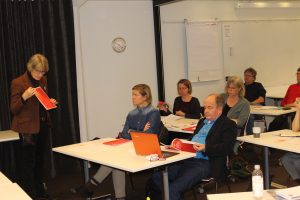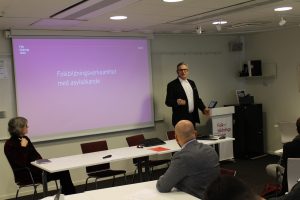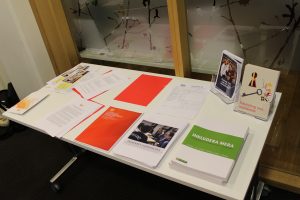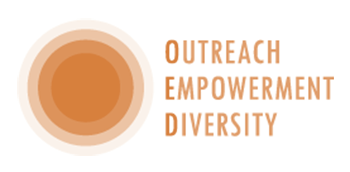IMPLEMENTING OUTREACH, EMPOWERMENT, DIVERSITY. Newly arrived migrants have different needs for support and learning opportunities depending on whether they reside in rural areas or in big cities. Swedish folk high schools play a big role in providing the support in both.
 “Newly arrived migrants to rural areas mean a positive development for the whole community,” said Lars Igeland, director of a Swedish folk high school at a conference, “Include more – about the folk high schools and an inclusive community”, held in Stockholm on the 13th of September.
“Newly arrived migrants to rural areas mean a positive development for the whole community,” said Lars Igeland, director of a Swedish folk high school at a conference, “Include more – about the folk high schools and an inclusive community”, held in Stockholm on the 13th of September.
The conference, a part of implOED events, focused on the role of Swedish non-formal education, “folkbildning”, in the inclusion of migrants. The conference was a cooperation between actors in the Swedish “folkbildning” and researchers. The conference gathered around 90 researchers, teachers, managers and other actors in the field.
Adult education institutions as a hub for inclusion
When a group of newly arrived migrants are directed to temporary accommodations (refugee homes) in a village, sometimes the attitudes of the locals can be xenophobic. Lars Igeland gave the seminar participants advise on how to turn possible negative attitudes among the locals into a positive inclusion process, for the benefit of all, the migrants and the locals. In this process adult education institutions play a big role.
An adult education institution can be used as a local meeting place for language training, for work, for sport, even for trade (such as a workshop for repairing old bicycles) – or just for having fun together. Course participants at the institution can act as trainers and guides.
The folk high school should listen to the newly arrived and give place for them to get organized. It should also take an active role towards the authorities to facilitate the inclusion process. Lars Igeland has also produced a report Välkommen till Sverige, as part of implOED project.
 Ingegerd Akselsson Le Douaron from FOLAC (Folkbildning- Learning for Active Citizenship) presented OED, the follow up project implOED and the Swedish project “Inkludera mera”. All projects have worked with recognising concrete and successful methods for inclusion and learning for active citizenship.
Ingegerd Akselsson Le Douaron from FOLAC (Folkbildning- Learning for Active Citizenship) presented OED, the follow up project implOED and the Swedish project “Inkludera mera”. All projects have worked with recognising concrete and successful methods for inclusion and learning for active citizenship.
Outreaching new arrivals
“We are not arranging courses for the migrants but (together) with them,” said Torvald Åkesson, administrator at the Swedish National Council of Adult Education. He administrates the special state funding directed to learning activities with migrants.
Torvald Åkesson was one of the two lecturers when teachers and management staff in Swedish folk high schools of rural parts of the country gathered in Stockholm 21th of November, to an event organised by FOLAC. The participants were invited to discuss good practises within the EU and Sweden, working with migrants and how to combat xenophobia in the local community.
The Swedish folk high schools are free institutions outside the official education system for adult learning with regular funding from the state and the regional authorities. The 154 folk high schools and 10 national study organisations, “folkbildning”, will this year receive nearly 26 million Euro from the state, an additional funding to be used to provide services for asylum seekers.
These adult education institutions have been appointed a task to arrange information about the Swedish society and language courses with asylum seekers living in temporary accommodation arranged by the Swedish Migration board. This group of newly arrived has not been offered education funded by the state before. The folk high schools will be able to carry out outreach activities and invite the new arrivals to learning activities. The participants in the seminar agreed that this is an advantage compared to receiving course participants which are directed to the school by authorities.
“The ‘trust’ from the state that provides the regular funding, combined with a high degree of freedom for the folk high schools, is essential to be able to work closely with the course participants and meet their needs. But this freedom is of course connected with a responsibility,” Torvald Åkesson stated.
Maria Vallström has done research on what happens when a village grows rapidly due to migration.
“We all have to ask ourselves who ‘we’ and ‘they’ are,” she said. “A post-colonial attitude including orientalism towards the newly arrived can lead to exclusion and persistence conflicts and should be avoided. ‘We’ are simply all people who happen to live at one place. The folk high schools are valuable local resources, as local meeting places.”
Strengthening democracy in the big cities
 There is today a big need for meeting places where different kinds of people can learn and develop peaceful and powerful ways to be heard and to participate as active citizens in the community. Adult education institutions can provide that.
There is today a big need for meeting places where different kinds of people can learn and develop peaceful and powerful ways to be heard and to participate as active citizens in the community. Adult education institutions can provide that.
In most of the big cities in Sweden you can find folk high schools. These folk high schools have often established at least a part of their activities in poor areas, where the unemployment is high, the average level of education and the income rate are low and the share of people born in countries outside of EU is bigger than average in the country. These areas have lately drawn attention from media, in Sweden and abroad because of problems with criminality, robberies, violence and riots. Xenophobic forces have blamed migrants for these problems.
As a part of the EU project implOED, FOLAC invited managements and teachers from folk high schools in the big cities to discuss good practises from the project and from Sweden – and to share their own experiences and learn more with focus on active citizenship.
“The Swedish government has high expectations on what the study organisations and the folk high schools can achieve,” said Torvald Åkesson, one of the invited lectures.
“The more involved people are, the better the community development is going to turn out,” said Nazem Tahvilzadeh who has studied the relations between social movements and the official authorities in poor parts of big cities.
A vital democracy cannot be ruled from above and put into already existing frames, by asking the people premade questions and demanding traditional organisation forms. Many creative activities often have conflicts as starting points. The politicians and the authorities need to listen to the needs of the migrants.
Adult education can provide training on how to express needs, demands and suggestions, to guide through the official system, and also to encourage local actions.
Text: Ingegerd Akselsson Le Douaron
Photos: Mats Ehn, Ulrika Knutson
